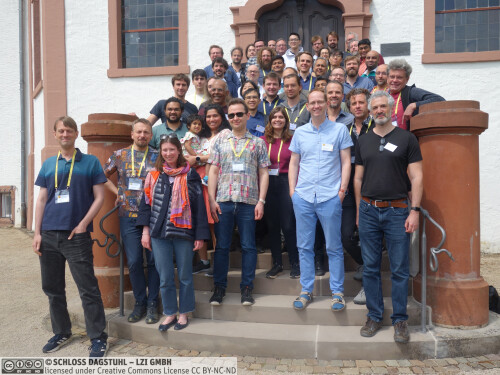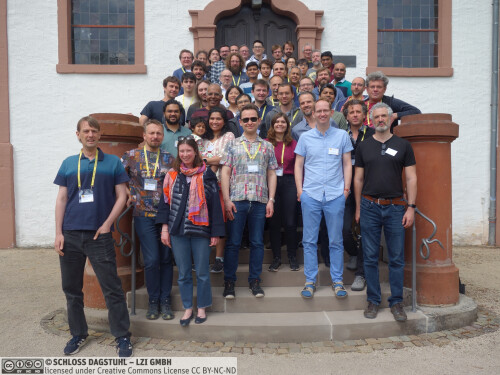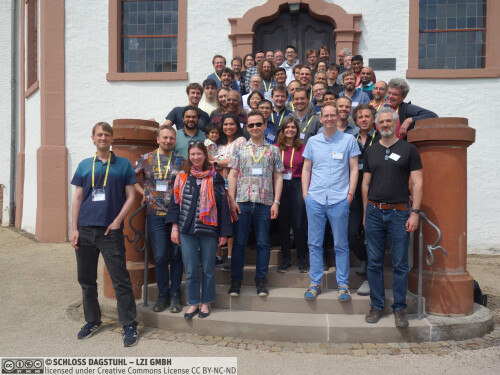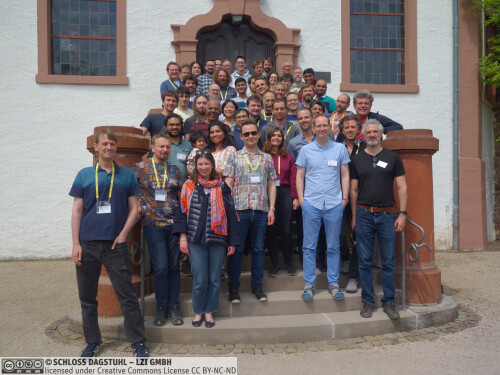Dagstuhl-Seminar 25211
The Constraint Satisfaction Problem: Complexity and Approximability
( 18. May – 23. May, 2025 )
Permalink
Organisatoren
- Manuel Bodirsky (TU Dresden, DE)
- Venkatesan Guruswami (University of California - Berkeley, US)
- Dániel Marx (CISPA - Saarbrücken, DE)
- Stanislav Živný (University of Oxford, GB)
Kontakt
- Andreas Dolzmann (für wissenschaftliche Fragen)
- Christina Schwarz (für administrative Fragen)
Gemeinsame Dokumente
- Dagstuhl Materials Page (Use personal credentials as created in DOOR to log in)
Programm
The main aim of this Dagstuhl Seminar is to bring together leading researchers from all areas of activity in the theory of computation who use the constraint satisfaction paradigm, so that they can communicate state-of-the-art advances, share deep insights, and embark on a systematic interaction that will further develop the synergy between the different areas, generate new research avenues, and lead to fruitful attacks on the open problems in this area.
Constraint satisfaction has always played a central role in computational complexity theory; appropriate versions of CSPs are classical complete problems for most standard complexity classes. CSPs constitute a very rich and yet sufficiently manageable class of problems to give a good perspective on general computational phenomena. For instance, they help to understand which mathematical properties make a computational problem tractable (in a wide sense, e.g. polynomial-time solvable or non-trivially approximable, fixed-parameter tractable or definable in a weak logic). One of the most striking features of this research direction is the variety of different branches of mathematics (including algebra and logic, combinatorics and graph theory, probability theory and mathematical programming, and most recently topology) that are used to achieve deep insights in the study of the CSP, and this seminar will contribute towards further synergy in the area. In the last 20 years, research activity in this area has significantly intensified and hugely impressive progress was made.
The main topics addressed during the seminar will include complexity dichotomies for CSP and related problems, promise CSPs, approximability of CSPs, counting CSPs, and parameterized complexity of CSPs. The participants will also explore the interactions between these topics.
 Manuel Bodirsky, Venkatesan Guruswami, Dániel Marx, and Stanislav Živný
Manuel Bodirsky, Venkatesan Guruswami, Dániel Marx, and Stanislav Živný
Please log in to DOOR to see more details.
- Per Austrin (KTH Royal Institute of Technology - Stockholm, SE) [dblp]
- Libor Barto (Charles University - Prague, CZ) [dblp]
- Arash Beikmohammadi (Simon Fraser University - Burnaby, CA)
- Amey Bhangale (University of California - Riverside, US) [dblp]
- Manuel Bodirsky (TU Dresden, DE) [dblp]
- Zarathustra Brady (Setauket, US)
- Johanna Brunar (TU Wien, AT)
- Andrei A. Bulatov (Simon Fraser University - Burnaby, CA) [dblp]
- Silvia Butti (University of Oxford, GB) [dblp]
- Karthik C. S. (Rutgers University - New Brunswick, US) [dblp]
- Siu On Chan (Hong Kong, HK) [dblp]
- Victor Dalmau (UPF - Barcelona, ES) [dblp]
- Anuj Dawar (University of Cambridge, GB) [dblp]
- Dmitry Feichtner-Kozlov (Universität Bremen, DE) [dblp]
- Florian Frick (Carnegie Mellon University - Pittsburgh, US) [dblp]
- Venkatesan Guruswami (University of California - Berkeley, US) [dblp]
- Santiago Guzmán Pro (TU Dresden, DE)
- Maximilian Hadek (Charles University - Prague, CZ)
- Prahladh Harsha (TIFR - Mumbai, IN) [dblp]
- Johan Hastad (KTH Royal Institute of Technology - Stockholm, SE) [dblp]
- Peter Jonsson (Linköping University, SE) [dblp]
- Eun Jung Kim (KAIST - Daejeon, KR & CNRS - Paris, FR) [dblp]
- Pravesh K. Kothari (Princeton University, US) [dblp]
- Marcin Kozik (Jagiellonian University - Kraków, PL) [dblp]
- Andrei Krokhin (Durham University, GB) [dblp]
- Euiwoong Lee (University of Michigan - Ann Arbor, US) [dblp]
- Konstantin Makarychev (Northwestern University - Evanston, US) [dblp]
- Yury Makarychev (TTIC - Chicago, US) [dblp]
- Barnaby Martin (Durham University, GB) [dblp]
- Dániel Marx (CISPA - Saarbrücken, DE) [dblp]
- Antoine Mottet (TU Hamburg, DE) [dblp]
- Tomáš Nagy (Jagiellonian University - Kraków, PL) [dblp]
- Tamio-Vesa Nakajima (University of Oxford, GB)
- Jakub Opršal (University of Birmingham, GB) [dblp]
- George Osipov (Linköping University, SE) [dblp]
- Marcin Pilipczuk (University of Warsaw, PL) [dblp]
- Michael Pinsker (TU Wien, AT) [dblp]
- Aaron Potechin (University of Chicago, US) [dblp]
- Xuandi Ren (University of California - Berkeley, US)
- Jakub Rydval (TU Wien, AT) [dblp]
- Žaneta Semanišinová (TU Dresden, DE) [dblp]
- Santhoshini Velusamy (TTIC - Chicago, US)
- Uli Wagner (IST Austria - Klosterneuburg, AT) [dblp]
- Magnus Wahlström (Royal Holloway, University of London, GB) [dblp]
- Michal Wrona (Jagiellonian University - Kraków, PL) [dblp]
- Dmitriy Zhuk (Charles University - Prague, CZ) [dblp]
- Stanislav Živný (University of Oxford, GB) [dblp]
Verwandte Seminare
- Dagstuhl-Seminar 06401: Complexity of Constraints (2006-10-01 - 2006-10-06) (Details)
- Dagstuhl-Seminar 09441: The Constraint Satisfaction Problem: Complexity and Approximability (2009-10-25 - 2009-10-30) (Details)
- Dagstuhl-Seminar 12451: The Constraint Satisfaction Problem: Complexity and Approximability (2012-11-04 - 2012-11-09) (Details)
- Dagstuhl-Seminar 15301: The Constraint Satisfaction Problem: Complexity and Approximability (2015-07-19 - 2015-07-24) (Details)
- Dagstuhl-Seminar 18231: The Constraint Satisfaction Problem: Complexity and Approximability (2018-06-03 - 2018-06-08) (Details)
- Dagstuhl-Seminar 22201: The Constraint Satisfaction Problem: Complexity and Approximability (2022-05-15 - 2022-05-20) (Details)
Klassifikation
- Computational Complexity
- Data Structures and Algorithms
Schlagworte
- constraint satisfaction problem
- computational complexity
- hardness of approximation
- semidefinite programming
- parameterized complexity





 Creative Commons BY 4.0
Creative Commons BY 4.0
